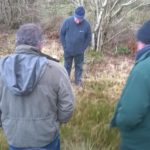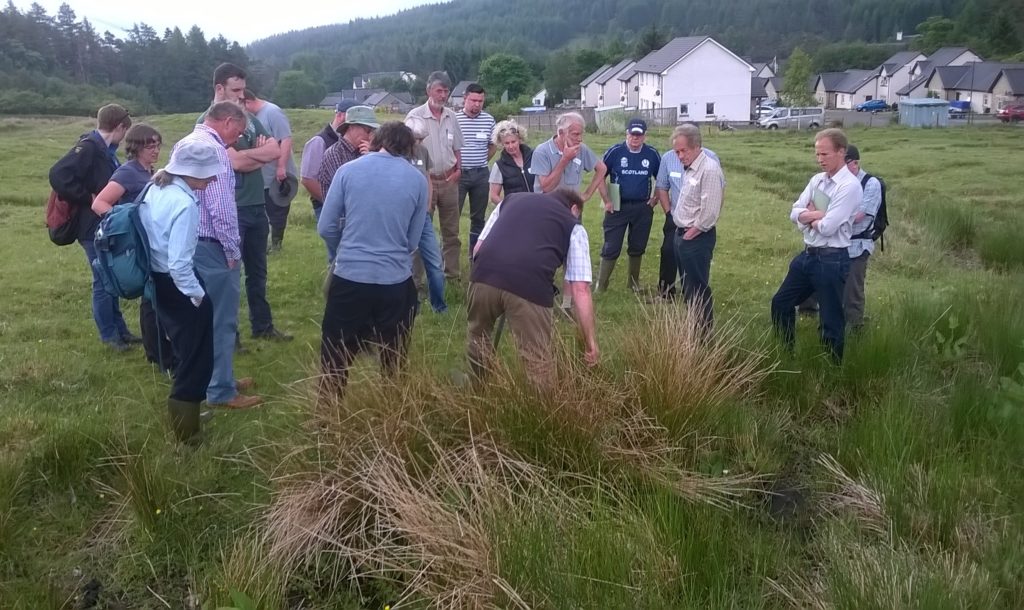Don’t Rush Your Drains: Oban – Event Summary
1 February 2018It has been a very wet year!

After a very wet year the topic of this meeting, “Drainage and Rush Control”, was well received by the 33 farmers & crofters from around Oban.
Conservation specialist Helen Bibby gave a detailed presentation about the different species of rush and their wildlife value. However, dense Juncus effusus (Soft rush) is a problem. SRUC’s Hill & Mountain Research Centre farm manager Ewen Campbell shared his practical experience of rushes and flooding during some very wet years at the Kirkton & Auchtertyre Farms.
Control of rushes
The efficiency of different mechanical and chemical control methods were examined by local advisor Trevor Polley. There are pros and cons to any method chosen whether it be mowing, sward lifting, reseeding, weed wiping etc. You can read the presentation slides used by Helen, Ewan and Trevor here.
Soils and drainage expert, Gavin Elrick then discussed the factors involved in the movement of water through the soil. Soil texture, structure and compaction need to be looked at before embarking on drainage programmes. Determining the depth of any compaction will aid effective remediation. The overhauling of existing drains & ditches can give a good result. Read Gavin’s presentation slides for more information.
A visit to nearby wet fields for a practical exercise in spreading distances from watercourses sparked further discussion. 
Take home messages
- For effective rush control you need to look at overall management including; drainage, compaction, pH, nutrient status and grazing management.
- Mowing of rushes reduces density and helps maintain a grass sward but does not eradicate rushes.
- Mowing can maintain wildlife benefits of rushes if done in random patterns after 1st August
- Weedwiping is an effective control method (while glyphosate available)
- Field spraying is effective & efficient on suitable fields but is weather dependant.
- Overhaul existing drains and ditches before embarking on new drainage schemes.
You can download related information and the handouts availabe on the day through the links below.
- Technical Note (TN656): Soil Information, Texture & Liming Recommendations
- • Web based access to information on your soils on your farm is described. • Soil texture classes of mineral soils are described and identified by hand texturing. • Liming recommendations for different soils and managements are tabulated.
- Topics: Soils
- Visual Evaluation of Soil Structure (VESS) Score Chart
- This is a downloadable copy of the Visual Evaluation of Soil Structure (VESS) score chart for use in-field.
- Topics: Soils
- Valuing Your Soils – Practical Guidance for Scottish Farmers
- This brochure includes useful information about Scotland's agricultural soils and practical advice outlining the upfront financial savings and business benefits of better soil management and the efficient use of resources. Action and problem-specific 'field-sheets' are designed for busy farmers with limited time for reading.
- Topics: Climate Change, Soils, Water Management and Crops and Soils
- Farming For A Better Climate: Practical Guide – Field Drainage
- Topics: Soils and Water Management
- Practical Guide: Soil sampling I – How to take a soil sample
- This practical guide details what is required to take a soil sample for analysis that is representative of the area sampled.
- Topics: Climate Change, Soils and Water Management
- Practical Guide: Soil sampling II – Benefits to your business
- This practical guide details how soil sampling can benefit businesses by increasing productivity and create efficiencies on fertiliser inputs through better nutrient planning.
- Topics: Soils, Climate Change and Water Management
- Farming For A Better Climate: Practical Guide – Alleviating Soil Compaction
- This Practical Guide gives some ideas on how to alleviate soil compaction.
- Topics: Soils
- Farming For A Better Climate: Practical Guide – Improving Soil Quality
- This Practical Guide concentrates on how we can improve soil quality to help us to adapt to climate change.
- Topics: Soils
- Farming For A Better Climate: Practical Guide – Soil Management
- Topics: Soils
Sign up to the FAS newsletter
Receive updates on news, events and publications from Scotland’s Farm Advisory Service

